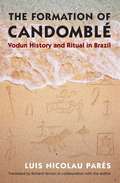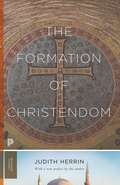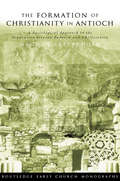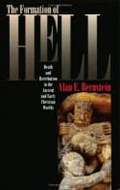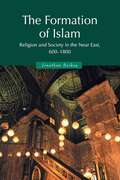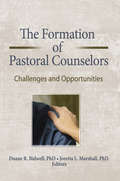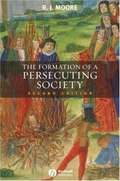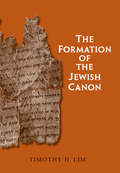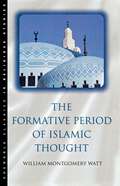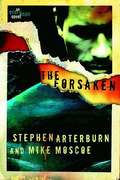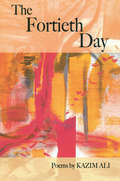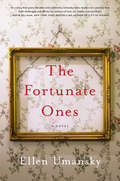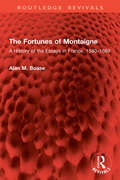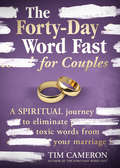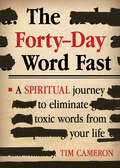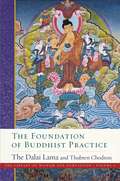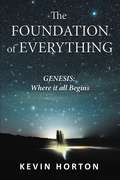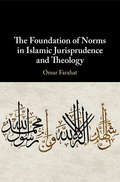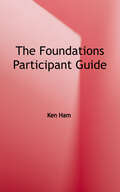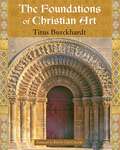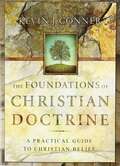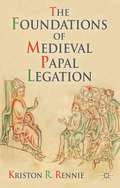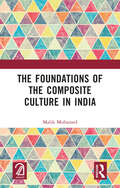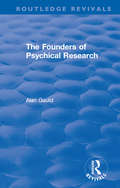- Table View
- List View
The Formation of Candomblé
by Luis Nicolau ParésInterweaving three centuries of transatlantic religious and social history with historical and present-day ethnography, Luis Nicolau Pares traces the formation of Candomble, one of the most influential African-derived religious forms in the African diaspora, with practitioners today centered in Brazil but also living in Europe and elsewhere in the Americas. Originally published in Brazil and not available in English, The Formation of Candomble reveals cultural changes that have occurred in religious practices within Africa, as well as those caused by the displacement of enslaved Africans in the Americas. Departing from the common assumption that Candomble originated in the Yoruba orixa (orisha) worship, Pares highlights the critical role of the vodun religious practices in its formation process. Vodun traditions were brought by enslaved Africans of Dahomean origin, known as the "Jeje" nation in Brazil since the early eighteenth century. The book concludes with Pares's account of present-day Jeje temples in Bahia, which serves as the first written record of the oral traditions and ritual of this particular nation of Candomble.
The Formation of Christendom (Princeton Classics #121)
by Judith HerrinA groundbreaking history of how the Christian “West” emerged from the ancient Mediterranean worldIn this acclaimed history of Early Christendom, Judith Herrin shows how—from the sack of Rome in 410 to the coronation of Charlemagne in 800—the Christian “West” grew out of an ancient Mediterranean world divided between the Roman west, the Byzantine east, and the Muslim south. Demonstrating that religion was the period’s defining force, she reveals how the clash over graven images, banned by Islam, both provoked iconoclasm in Constantinople and generated a distinct western commitment to Christian pictorial narrative. In a new preface, Herrin discusses the book’s origins, reception, and influence.
The Formation of Christianity in Antioch: A Social-Scientific Approach to the Separation between Judaism and Christianity
by Magnus ZetterholmMagnus Zetterholm uses theoretical insights from the social sciences to deal with the complex issues raised by the parting of Judaism and Christianity, and the accompanying rise of Christian anti-Semitism in ancient Antioch. Unlike previous attempts to solve this problem have focused mainly on ideology, Zetterholm's excellent study emphasizes the interplay between sociological and ideological elements. For students of religious studies, classical studies, history and social science, this will give leverage and knowledge in the pursuit of their course studies.
The Formation of Hell: Death and Retribution in the Ancient and Early Christian World
by Alan E. BernsteinThe author examines the images of death and afterlife from Ancient Greek, Jewish, and Christian sources. Chapter headings focus on neutral deaths, moral deaths, dividing the dead, Divine Sovreignty, Divine Mercy, etc. within these larger categories. He explains how the images of hell have been used and continue to be used in tehse cultures.
The Formation of Islam: Religion and Society in the Near East, 600-1800 (Themes in Islamic History #Number Two)
by Patricia Crone Jonathan P. BerkeyJonathan Berkey surveys the religious history of the peoples of the Near East from approximately 600 to 1800 c.e. After examining the religious scene in the Near East in late antiquity, he investigates Islam's first century, the "classical" period from the accession of the Abbasids to the rise of the Buyid amirs. He then traces the emergence of new forms of Islam in the middle period, deftly showing how Islam emerged slowly as part of a prolonged process.
The Formation of Papal Authority in Late Antique Italy
by Kristina SessaThis book is the first cultural history of papal authority in late antiquity. While most traditional histories posit a 'rise of the papacy' and examine popes as politicians, theologians and civic leaders, Kristina Sessa focuses on the late Roman household and its critical role in the development of the Roman church from c.350-600. She argues that Rome's bishops adopted the ancient elite household as a model of good government for leading the church. Central to this phenomenon was the classical and biblical figure of the steward, the householder's appointed agent who oversaw his property and people. As stewards of God, Roman bishops endeavored to exercise moral and material influence within both the pope's own administration and the households of Italy's clergy and lay elites. This original and nuanced study charts their manifold interactions with late Roman households and shows how bishops used domestic knowledge as the basis for establishing their authority as Italy's singular religious leaders.
The Formation of Pastoral Counselors: Challenges and Opportunities
by Duane R. Bidwell Joretta L. MarshallExplore the concept of formation in pastoral counseling from a variety of perspectives Two dozen of the most prominent clinicians and scholars in the field reflect on The Formation of Pastoral Counselors from clinical, theological and theoretical perspectives. This unique book explores the challenges to the personal and professional formation of pastoral counselors in a cultural and historic context that&’s radically different from the era when the profession first emerged as a specialized ministry. Contributors examine formation from a variety of contexts and perspectives, including spirituality and gender, address theological education and intercultural issues, and present emerging models for pastoral counselors. The Formation of Pastoral Counselors is a practical guide for educators working to shape curricula and training programs to the shifting context in which pastoral counselors are formed for ministry, service, and lifelong learning. This unique book examines ideas about appropriate content and processes for the formation of pastoral care professionals and looks at specialized contextual training models that form their emerging identities. The book&’s contributors call on extensive experience in pastoral theology, care, and counseling to explore the essential components of formation across different contexts; how those contextual realities change the delivery systems; the epistemological nature of formation; reasons for the limited roles that formal theological education and spiritual experience seem to play at the moment; and why formation is rarely formally addressed in pastoral counseling training. Topics discussed in The Formation of Pastoral Counselors include: the turn to formation the goals of theological education core elements of pastoral theology developing spiritual practices diversity pastoral counseling training programs race and ethnicity in the formation of pastoral counselors cultural identity intercultural contexts practical relevancy in training gender identity and sexual orientation economic disparity Models and practices examined in The Formation of Pastoral Counselors include: parallel charting clinician narratives group supervision Benedictine spirituality academic and clinical training at the Claremont School of Theology the model of formation at the Virginia Institute of Pastoral Care (VIPCare) and much more The Formation of Pastoral Counselors is an essential guide for pastoral counselors, faculty in pastoral theological care and counseling, and training directors in pastoral counseling centers.
The Formation of a Persecuting Society Authority and Deviance in Western Europe 950-1250, Second Edition
by R. I. MooreThe tenth to the thirteenth centuries in Europe saw the appearance of popular heresy and the establishment of the Inquisition, the expropriation and mass murder of Jews, and the propagation of elaborate measures to segregate lepers from the healthy and curtail their civil rights. In this book, R. I. Moore argues that the coincidences in the treatment of these and other minority groups cannot be explained independently, and that all are part of a pattern of persecution which now appeared for the first time to make Europe become, as it has remained, a persecuting society.
The Formation of the Jewish Canon
by Timothy H. LimThe discovery of the Dead Sea Scrolls provides unprecedented insight into the nature of the Hebrew Bible or Old Testament before its fixation. Timothy Lim here presents a complete account of the formation of the canon in Ancient Judaism from the emergence of the Torah in the Persian period to the final acceptance of the list of twenty-two/twenty-four books in the Rabbinic period. Using the Hebrew Bible, the Scrolls, the Apocrypha, the Letter of Aristeas, the writings of Philo, Josephus, the New Testament, and Rabbinic literature as primary evidence he argues that throughout the post-exilic period up to around 100 CE there was not one official "canon" accepted by all Jews; rather, there existed a plurality of collections of scriptures that were authoritative for different communities. Examining the literary sources and historical circumstances that led to the emergence of authoritative scriptures in ancient Judaism, Lim proposes a theory of the majority canon that posits that the Pharisaic canon became the canon of Rabbinic Judaism in the centuries after the destruction of the Jerusalem Temple.
The Formative Period of Islamic Thought
by W. Montgomery WattThis text gives a formative account of the development of Islamic thought from the death of Muhammad in 632, to 950. It demonstrates how various religions and political movements within Islam contributed to what has become standard form, including the positive contribution of sects later regarded as heretical, and the key interaction of religion and politics. Drawing on many previously unresearched Arabic sources, it presents a comprehensive, balanced and clear picture of the main lines of philosophical development in this important period.
The Forsaken: An Every Man Novel
by Stephen Arterburn Michael MoscoeOne man faces his worst nightmare--twice. A thrilling new novel from the Every Man team!Ben Taylor's just a regular guy. Married to his beautiful Annie, with good kids, and a career that brings him great joy. But the world as he knows it suddenly shifts beneath his feet. While his job is suddenly in jeopardy, Annie gets promoted into the position of a lifetime-with a bigger salary than his...and a requirement to move across the country.The blow to his ego, not to mention the disruption to his family, shatters Ben's confidence in himself-and in God. But just as he comes to grips with this new reality and accepts these major changes, the unimaginable happens. His wife is kidnapped!Desperate, Ben travels across country to help the police hunt for the kidnappers by risking his life and everything else in the process. Can he really trust the God he thought he knew to get him through this shocking twist in life? Or is he destined to be just as forsaken as he feels?Now Stephen Arterburn-one of the men behind the phenomenal Every Man series-and bestselling novelist Mike Moscoe join forces to bring you a compelling novel that combines the action and suspense of a thriller with real-life faith and insight for God's men.From the Trade Paperback edition.
The Fortieth Day (American Poets Continuum)
by Kazim AliFrom the Bible to the Quaraan, the fortieth day symbolizes the last moment before deliverance, a moment in time when a supplicant or prophet or stormbeaten passenger knows there is no state &“after,&” but finally accepts the present state as a permanent one.In The Fortieth Day, Kazim Ali follows the fractured narratives and moving lyrics of his debut collection, The Far Mosque, with a deeply spiritual and meditative book exploring the rhetoric of prayer.Kazim Ali was born in the United Kingdom and raised in an Islamic household. He holds degrees from the University at Albany and New York University. He lives in Oberlin, Ohio.
The Fortunate Ones: A Novel
by Ellen UmanskyA BOOKLIST BEST DEBUT NOVEL OF THE YEAROne very special work of art—a Chaim Soutine painting—will connect the lives and fates of two different women, generations apart, in this enthralling and transporting debut novel that moves from World War II Vienna to contemporary Los Angeles.It is 1939 in Vienna, and as the specter of war darkens Europe, Rose Zimmer’s parents are desperate. Unable to get out of Austria, they manage to secure passage for their young daughter on a kindertransport, and send her to live with strangers in England. Six years later, the war finally over, a grief-stricken Rose attempts to build a life for herself. Alone in London, devastated, she cannot help but try to search out one piece of her childhood: the Chaim Soutine painting her mother had cherished.Many years later, the painting finds its way to America. In modern-day Los Angeles, Lizzie Goldstein has returned home for her father’s funeral. Newly single and unsure of her path, she also carries a burden of guilt that cannot be displaced. Years ago, as a teenager, Lizzie threw a party at her father’s house with unexpected but far-reaching consequences. The Soutine painting that she loved and had provided lasting comfort to her after her own mother had died was stolen, and has never been recovered.This painting will bring Lizzie and Rose together and ignite an unexpected friendship, eventually revealing long-held secrets that hold painful truths. Spanning decades and unfolding in crystalline, atmospheric prose, The Fortunate Ones is a haunting story of longing, devastation, and forgiveness, and a deep examination of the bonds and desires that map our private histories.
The Fortunes of Montaigne: A History of the Essays in France, 1580–1669 (Routledge Revivals)
by Alan M. BoaseMontaigne’s Essays were republished in France every two or three years from 1580–1669. The Fortunes of Montaigne (originally published in 1935) aims to show what those who bought these Essays during that period sought or found there.The author has attempted to answer three questions in the volume—what are the general ideas of those who are particularly drawn to Montaigne or who write against him?; what did these writers think of the Essays, and what specially interested them in the book?; and what did they borrow from him, or more profitably, what are their less conscious borrowings, their adaptations of his ideas? The book gives an account of the criticism and appreciation of the Essays. Further, it discusses the development of Humanism as opposed to orthodox Christianity, and the part played by the Essays in that development.This book will be of interest to students and researchers of philosophy, history, and literature.
The Forty-Day Word Fast for Couples: A Spiritual Journey to Eliminate Toxic Words From Your Marriage
by Tim CameronChange your words. Change your marriage.The Forty-Day Word Fast for Couples is a book about doing the hard work of learning and then practicing intimacy and pursuing unity in marriage. Husbands and wives will undertake this journey together. As a result, they will uncover the obstacles that have stood in the way of their God-given heart's desire for a profound oneness in Christ. Couples will break through to a new level of tenderness, kindness, and intimacy as they do the following: Discover God's original design for words Identify the devastating impact of negative wordsAccess the tools to uncover the roadblocks and strongholds that have stood in the way of greater intimacy in every area of their married lifeBecome offense-proof in their marriage through the forty-day fast of words God's design for couples is to pursue oneness through speaking words of truth and kindness. The enemy and the world have perverted this design. Death and life are in the power of the tongue. There is a reason Proverbs 18:21 lists death first. This book will help make clear—perhaps for the first time—the actual ramifications of complaining, criticism, judgments, gossip, and negative words on a marriage. These words are the "unity busters." Through fasting from these negative words, you will discover a biblical way to change the atmosphere of your marriage.This book will help you protect your marriage by identifying words that either build it up or break it down.
The Forty-Day Word Fast: A Spiritual Journey to Eliminate Toxic Words From Your Life
by Tim CameronAt some point in your Christian walk you may have fasted from food, television, or other things in order to refocus and rekindle your relationship with Christ. Fasting may even be a frequent part of your prayer life. But have you ever fasted from words? The truth is that even if you consider yourself to be a positive person, you still use damaging words that plague your life and rob you of the spiritual growth you desire.Change your words. Change your life.The Forty-Day Word Fast focuses on several biblically sound mechanisms to help you change your words and your life. Not only will your vocabulary change, your heart also will be transformed in just forty days. &“For out of the abundance of the heart the mouth speaks&” (Matt. 12:34 nkjv). With this guaranteed effective form of fasting you will be challenged to eradicate from your speech all words of...JudgmentCriticism or sarcasmNegativityComplainingGossip
The Foundation of Buddhist Practice (The Library of Wisdom and Compassion #1)
by His Holiness the Dalai Lama Venerable Thubten ChodronThe second volume in the Dalai Lama’s definitive and comprehensive series on the stages of the Buddhist path, The Library of Wisdom and Compassion. Volume 1, Approaching the Buddhist Path, contained introductory material that set the context for Buddhist practice. This second volume describes the foundation—the important teachings that will help us establish a flourishing Dharma practice. Traditional presentations of the path in Tibetan Buddhism assume the audience already has faith in the Buddha and believes in rebirth and karma, but the Dalai Lama realized early on that a different approach was needed for his Western students. Starting with the four seals and the two truths, His Holiness illuminates key Buddhist ideas, such as dependent arising and emptiness, to support the reader in engaging with this rich tradition. This second volume in the new Library of Wisdom and Compassion series provides a wealth of reflections on Buddhist history and fundamentals, contemporary issues, and the Dalai Lama’s own personal experiences.
The Foundation of Everything: Genesis
by Kevin HortonDiscover a Solid Foundation for Everything The first pages of the Bible cause great turmoil in the minds of many well-educated people because the words of this book are contradicted by much of what we have been taught in twenty-first-century education. Geology teaches us that this world is billions of years old (deep time). Biology makes use of deep time to allow for the evolution of life. Evolution teaches that it is through death and struggle that life continuously improves and advances. In evolution, death is a vital selection mechanism in the removal of less evolved life forms. This death-selection mechanism is imagined as the means in which random changes in DNA is filtered to advance higher life forms. When one opens the Bible, you are given a totally different scenario. <P><P>Life was specially created on this earth and not very long ago. The creator of life is not death and struggle as Darwinian evolution teaches. Rather the Creator is an all-powerful intelligent Being. He willfully created the universe, the planet Earth, and all life therein. God imposed death upon all living creatures as a result of the original sin of the first humans and is a curse, not a creator. People of faith and those struggling to discover faith are challenged by this battle between science and the Bible. Many Christian believers have decided to consider the first pages of the Bible to be a myth and not to be taken literally. Who is to say, per this view, that God did not simply use evolution to bring about life? Yet when we stop and are honest with ourselves, this compromise causes an ever-present doubt about the validity of the Bible. After all, if it is not correct on the first page, dare we trust the rest of it? There is much more at stake. There exist issues, questions that people want to ask God, which cannot be answered if the first pages are simply myth. <P>In contrast, these questions are answered when the Bible is allowed to mean what it says; let me explain this further: when people of the twenty-first century approach the first three chapters of Genesis, they are tempted to explain away the clear meaning of the original Hebrew text in order to make the text fit into our cultural understanding of origins. But when we allow the Bible to speak for itself following standard rules of Hebrew grammar, it is amazing how much it addresses seminal questions of life. It is then that a person will build a solid foundation for a jubilant life of faith. The first pages of the Bible lay the foundation for all that follows. You might well say that the first pages of the Bible inform us of how everything came to be and forms the true foundation of everything!
The Foundation of Norms in Islamic Jurisprudence and Theology: Divine Commands In Jurisprudence And Theology
by Omar FarahatIn this book, Omar Farahat presents a new way of understanding the work of classical Islamic theologians and legal theorists who maintained that divine revelation is necessary for the knowledge of the norms and values of human actions. Through a reconstruction of classical Ashʿarī-Muʿtazilī debates on the nature and implications of divine speech, Farahat argues that the Ashʿarī attachment to revelation was not a purely traditionalist position. Rather, it was a rational philosophical commitment emerging from debates in epistemology and theology. He further argues that the particularity of this model makes its distinctive features helpful for contemporary scholars who defend a form of divine command theory. Farahat's volume thus constitutes a new reading of the issue of reason and revelation in Islam and breaks new ground in Islamic theology, law and ethics.
The Foundations Participant Guide
by Ken Ham Answers In GenesisThe Participant Workbook will usher you through the 12 DVD sessions, and help you recognize today's attacks on the Word of God, beginning in Genesis. You will be equipped with answers to questions such as, Why should we trust the Bible? Are the creation days in Genesis literal days? Where did the "races" come from? and How can we evangelize effectively in today's culture? For Jr. High through Adults.
The Foundations of Christian Art
by Titus BurckhardtTitus Burckhardt was a renowned expert on the art of traditional worlds. This book takes the reader through the history of Christian art, focusing especially upon architecture, iconography, and illumination.
The Foundations of Christian Doctrine
by Kevin J. ConnerThe Foundations of Christian Doctrine provides one of the most relevant and clear presentations of the great doctrines of faith. Without a solid foundation in theology, it is difficult to be a sound interpreter and exegete of the Scriptures. This highly acclaimed textbook is fast becoming a standard work for many Bible colleges around the world.
The Foundations of Medieval Papal Legation
by Kriston R. RennieKriston R. Rennie examines the origins and development of medieval papal representation by exploring the legate's wider historical, legal, diplomatic, and administrative impact on medieval European law and society. This critical study is key to understanding the growth and power of the medieval Church and papacy in the early Middle Ages.
The Foundations of the Composite Culture in India
by Malik MohamedIn The Foundations of the Composite Culture in India, the focus of the author is the process of establishment of Hindu-Muslim unity as a result of historical, social and cultural factors over a period of ten centuries. Traversing this era, he reveals how the Muslim rulers contributed to such harmony and how the two cultures exchanged and accepted each other's tenets to enrich and formulate a composite Indian culture. To explore the foundations on which the complex culture of India rests, the author examines the contribution of Sufism which inherently connotes syncretism and tolerance, as well as the simultaneous rise of the Bhakti movement in medieval India. This title is co-published with Aakar Books. Print editions not for sale in South Asia (India, Sri Lanka, Nepal, Bangladesh, Pakistan and Bhutan)
The Founders of Psychical Research (Routledge Revivals)
by Alan GauldOriginally published in 1968 The Founders of Psychical Research is centred upon the lives and work of Henry Sidgwick, Edmund Gurney and Frederic Myers – prominent in the Society for Psychical Research (S.P.R) - during its early years: it is not a history of the Society. It passes over important aspects of the S.P.R.’s story and deals at some length with matters quite outside it. The book frequently gives accounts of ‘paranormal’ phenomena which if indeed they occurred, would not be explainable through any recognisable hypothesis, but are treated throughout as unexplained.
